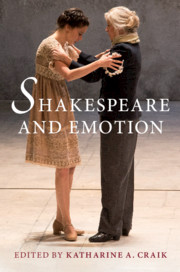Book contents
- Shakespeare and Emotion
- Shakespeare and Emotion
- Copyright page
- Contents
- Figures
- Contributors
- Acknowledgements
- Note on Text
- Introduction
- Part I Contexts
- Part II Emotions
- Chapter 13 Fear
- Chapter 14 Grief
- Chapter 15 Sympathy
- Chapter 16 Shame
- Chapter 17 Anger
- Chapter 18 Pride
- Chapter 19 Happiness
- Chapter 20 Love
- Chapter 21 Nostalgia
- Chapter 22 Wonder
- Chapter 23 Confusion
- Bibliography
- Index
Chapter 17 - Anger
Titus Andronicus, Timon of Athens
from Part II - Emotions
Published online by Cambridge University Press: 01 October 2020
- Shakespeare and Emotion
- Shakespeare and Emotion
- Copyright page
- Contents
- Figures
- Contributors
- Acknowledgements
- Note on Text
- Introduction
- Part I Contexts
- Part II Emotions
- Chapter 13 Fear
- Chapter 14 Grief
- Chapter 15 Sympathy
- Chapter 16 Shame
- Chapter 17 Anger
- Chapter 18 Pride
- Chapter 19 Happiness
- Chapter 20 Love
- Chapter 21 Nostalgia
- Chapter 22 Wonder
- Chapter 23 Confusion
- Bibliography
- Index
Summary
In Shakespeare’s Titus Andronicus and Shakespeare and Middleton’s Timon of Athens the title characters express intense anger and desire for revenge, but nonetheless retain their masculinity and do not degenerate into weakness or effeminacy. This essay identifies ways that these plays use gender to influence how audiences distinguish between extreme and excessive anger. In Titus Tamora’s failure as an effective avenger keeps revenge a masculine pursuit. Moreover, the play maps an emotional register onto the Goth-Roman-Moor racial and moral spectrum. Whereas Aaron’s and Tamora’s anger appears excessive, Titus’ appears moderately and appropriately Roman – despite the violence it entails. In Timon, female characters are virtually absent, and the play clears a place for considering men’s anger and revenge that brackets off effeminacy. The grounds for Timon’s misanthropic, vengeful tirades, rather than gender, determine whether his emotions are excessive. The questions raised in both plays about the line between extreme and excessive anger, and the revenge that ensues, thus have political implications. What reasons and circumstances make anger and revenge a legitimate response to being wronged? Who decides, and what role does gender play in that determination?
- Type
- Chapter
- Information
- Shakespeare and Emotion , pp. 253 - 263Publisher: Cambridge University PressPrint publication year: 2020
- 1
- Cited by

